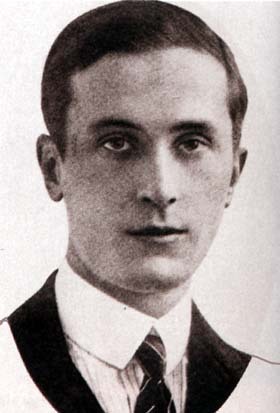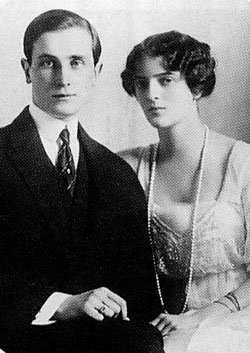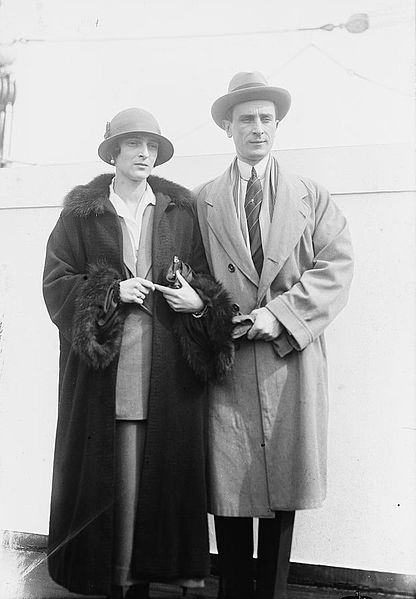<Back to Index>
- Mathematician Jurij Bartolomej Vega, 1754
- Architect Hassan Fathy, 1900
- Prince of the Russian Empire Felix Felixovich Yusupov, 1887
PAGE SPONSOR



Prince Felix Felixovich Yusupov, Count Sumarokov - Elston (Russian: Фéликс Фéликсович Юсýпов, граф Сумароков - Эльстон; March 23, 1887, Saint Petersburg, Russian Empire – September 27, 1967, Paris, France), was best known for participating in the murder of Grigori Rasputin, the faith healer who was said to have influenced decisions of Tsar Nicholas II and Tsaritsa Alexandra Feodorovna. Felix Yusupov was never punished for this murder, well known at the time, and a significant part of widespread Rasputin imagery was created by his own publications which demonized his victim.
Felix Yusupov was born in Saint Petersburg, capital of the Russian Empire. His mother's family, the Yusupovs, were of Tatar origin and very wealthy (there was a time when Felix Yusupov was the richest man in Russia). The Yusupov family acquired their wealth generations earlier through extensive land grants in Siberia, and they owned a string of profitable mines and fur trading posts. In order that the Yusupov name might not die out, the prince's father, Count Felix Felixovich Sumarokov - Elston (October 5, 1856, Saint Petersburg - June 10, 1928, Rome, Italy),General Governor of Moscow (1914 – 1915) (son of Count Felix Nikolaievich Sumarokov - Elston), took the surname of his wife, Princess Zenaida Nikolaievna Yusupova (September 2, 1861, Saint Petersburg - November 24, 1939, Paris) upon their marriage, on April 4, 1882 in Saint Petersburg, Russia. Felix became heir to the immense fortune after his older brother Nikolai Felixovich, Count Sumarokov - Elston (born 1883), was killed in a duel on June 22, 1908. Consulting with family members about how best to administer the money and property, he decided to devote time and money to charitable works to help the poor.
He also led a flamboyant life, and describes in his candid autobiography often spending time with Gypsy bands and adopting female clothing. From 1909 - 1912 he studied at University College, Oxford, in England, where he was a member of the Bullingdon club and established the Oxford University Russian Society. He married Princess Irina of Russia, the Tsar's niece, on February 22, 1914 in the Anichkov Palace in Saint Petersburg. The marriage was said to be extremely well matched and very happy, but that did not prevent ongoing rumors about Yusupov's homosexuality. The Yusupovs were on their honeymoon in Europe and the Middle East when World War I broke out. They were briefly detained in Berlin after the outbreak of hostilities. Irina asked her first cousin, Crown Princess Cecilie of Prussia to intervene with her father - in - law, the Kaiser. Kaiser Wilhelm II refused
to permit them to leave, but offered them a choice of three country
estates to live in for the duration of the war. Felix's father appealed
to the Spanish ambassador to Germany, and won permission for them to return to Russia via neutral Denmark to Finland, and from there to St. Petersburg. Felix converted a wing of his Moika Palace into
a hospital for wounded soldiers, but avoided entering military service
himself by taking advantage of a law exempting only - sons from serving.
He did enter the Cadet Corps and took an officer's training course, but
had no intention of joining a regiment. Irina's first cousin, Grand Duchess Olga Nikolaevna of Russia,
whom she had been close to when they were girls, was disdainful of
Felix: "Felix is a 'downright civilian,' dressed all in brown, walked
to and fro about the room, searching in some bookcases with magazines
and virtually doing nothing; an utterly unpleasant impression he makes
-- a man idling in such times," Olga wrote to her father, Tsar Nicholas
II, on 5 March 1915 after paying a visit to the Yusupovs. The Yusupovs' only daughter, Princess Irina Felixovna Yusupova, nicknamed Bebé, was born on 21 March 1915. "I shall never forget my happiness when I heard the child's first cry," her father wrote. Irina
liked her name and wanted to pass it on to her first child. Her mother
Xenia was so worried over the delivery that Tsarina Alexandra
Feodorovna said it was almost like Xenia was giving birth rather than
Irina.
It was in the Yusupov family's Moika Palace in Saint Petersburg that Yusopov, Grand Duke Dmitri and
others murdered Rasputin on the night of 16 /17 December 1916. Despite
being poisoned, shot four times, and beaten with an iron bar, the
victim refused to die. The conspirators finally had to tie him up and
throw him into the icy Neva River in
order to kill him. Yusupov published several accounts of the night and
the events surrounding it. Following the killing, Yusupov was subject
to a virtual house arrest in his estate outside Saint Petersburg. Recent authorities have cast doubt on Yusupov's account. Three months after the assassination, Tsar Nicholas II abdicated the throne in the February Revolution. Following the abdication, the Yusupovs returned to the Moika Palace before travelling to the Crimea. They later returned to the palace to retrieve jewellery and two paintings by Rembrandt, the sale proceeds of which helped sustain the family in exile. In the Crimea, the family boarded a British warship, HMS Marlborough, which took them from Yalta to Malta. While on the ship, Felix Yusupov enjoyed boasting about the murder of Rasputin. One of the British officers
noted that Irina "appeared shy and retiring at first, but it was only
necessary to take a little notice of her pretty, small daughter to
break through her reserve and discover that she was also very charming
and spoke fluent English". From Malta, they travelled to Italy, then by train to Paris. In Italy, lacking a visa, he bribed the officials with diamonds. In Paris, they stayed a few days in Hotel Vendôme before going on to London. In 1920, they returned to Paris and bought a house on the Rue Gutenberg in Boulogne - sur - Seine,
where they lived most of the rest of their lives. In exile, Irina and
Felix lived better than most emigres following the Revolution. The Yusupovs founded a short lived couture house Irfé, named after the first two letters of their first names. Irina
modeled some of the dresses the pair and other designers at the firm
created. They became renowned in the Russian émigré
community for his financial generosity. This philanthropy, plus
continued high living and poor financial management extinguished what
remained of the family fortune. Felix Yusupov's bad business sense and
the Wall Street Crash of 1929 eventually forced the company to shut down. Yusupov and his wife successfully sued MGM through the English courts for invasion of privacy and libel in connection with the 1932 film Rasputin and the Empress.
The alleged libel was not that the character based on Felix had
committed murder, but that the character based on Irina, called
"Princess Natasha" in the film, was portrayed as having been seduced by
the lecherous Rasputin. In
1934, the Yusupovs were awarded £25,000 damages, an enormous sum
at the time, which was attributed to the successful arguments of their
counsel Sir Patrick Hastings. The disclaimer which
now screens at the end of every American film, "The preceding was a
work of fiction, any similarity to a living person etc.," first
appeared as a result of the legal precedent set by the Yusupov case. Yusupov also sued the Columbia Broadcasting System in a New York court
in 1965 for televising a play based upon the Rasputin assassination.
The claim was that some events were fictionalized, and that under a New York City statute
Felix's commercial rights in his story had been misappropriated. The
last reported judicial opinion in the case was a ruling by New York's
second highest court that the case could not be resolved upon briefs
and affidavits but must go to trial. According to an obituary of CBS's lawyer, CBS eventually won the case. Felix
and Irina's daughter was largely raised by her paternal grandparents
until she was nine and was badly spoiled by them. Her unstable
upbringing caused her to become "capricious," according to Felix. Felix
and Irina, raised mainly by nannies themselves, were ill suited to take
on the day - to - day burdens of child rearing. Irina's only child adored
her father, but had a more distant relationship with her mother. Irina
and Felix, close to one another as they weren't to their daughter,
enjoyed a happy and successful marriage for more than fifty years. After Yusupov published his memoir detailing the death of Grigory Rasputin, Rasputin's daughter Maria sued
Yusupov and Grand Duke Dmitri Pavlovich in a Paris court for damages of
$800,000. She condemned both men as murderers and said any decent
person would be disgusted by the ferocity of Rasputin's killing. Maria's claim was dismissed. The French court ruled that it had no jurisdiction over a political killing that took place in Russia.
Yusupov died in Paris in 1967. He is buried in Sainte - Geneviève - des - Bois Russian Cemetery in the southern suburbs of Paris, France. Yusupov's private papers and a number of family artifacts and paintings are now owned by Victor Contreras,
a Mexican sculptor who, as a young art student in the 1960s, met
Yusupov and lived with the family for five years. He plans to turn his
home, south of Mexico City, into a museum where the artifacts will be
featured.